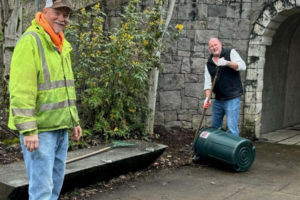Longtime buddies Tom Devlin and Phil Oaks had run half-marathons together, so a relatively short 3-mile jaunt on a scenic, wooded trail along Lacamas Lake should’ve been a piece of cake.
Surprisingly, though, Devlin started feeling uncomfortable less than a mile into their run on the Heritage Trail in Camas on that summer day in June 2016. The Vancouver resident thought he was being slowed by exercise-induced asthma, so he took a quick puff from his inhaler.
Then, he collapsed in the gravel.
Devlin, 58 at the time, actually went into cardiac arrest. His heart was no longer beating. He was slumped over, chin on his chest, unresponsive.
But fortunately, Oaks, a Washougal resident who is CPR-trained, knew what to do: Call 911 and start chest compressions right away.
More good fortune arrived as another CPR-trained runner happened by a few minutes later.
Christiana Adams, a certified unit assistant at Salem Health in Oregon, had just recently finished a new CPR training program, Resuscitation Quality Improvement, which is specifically for health care professionals.




